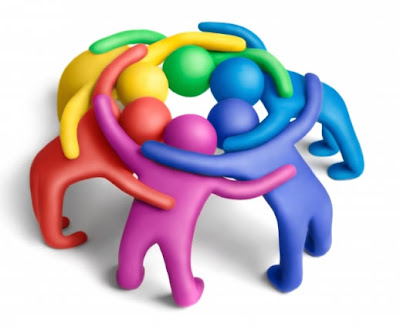Two basic societal set ups.
 OK I'm still on about:
OK I'm still on about: 'The Spirit Level - why equality is better for everyone' by Richard Wilkinson and Kate Pickett
I do love a bit of evolutionary psychology.
Off I go....
So there are egalitarian societies and those full of inequality. The book gives endless reasons for why the former is preferable (by demonstrating correlations between inequality and overall higher rates of: poor physical and mental health, mistrust in society, teenage pregnancy, violence etc etc) and giving reasons for why this might be so.
Then as the book gets really juicy (in my books that means more theoretical) towards the end it delivers this....
We have the strategies to deal with very different kinds of social organisation. At one extreme, dominance hierarchies are about self-advancement, status competition and 'kicking' people lower down in the pecking order to maintain this status. In this society, individuals have to be self-reliant and other people are encountered mainly as rivals for food and mates. (This was in evolutionary terms the pre-human state of play - survival of the fittest etc.)
At the other extreme is mutual interdependence and cooperation in which each person's security depends on the quality of their relationships with others and a sense of self worth comes less from status than from contribution made to the wellbeing of others. Rather than the overt pursuit of material self-interest, affiliative strategies depend on mutuality, reciprocity, fairness and the capacity for empathy and emotional bonding. (It is suggested this was an evolution that happened later and was demonstrated well by the very egalitarian hunter-gatherer societies that existed for thousands of years where fairness was paramount and social structures ensured it was perpetuated. It was farming that brought the opportunities for some to gather more wealth than others.)
The book goes on to state that as both of these strategies are part of our evolution as individuals we can 'access' both. It also provides biological evidence that shows stressful pregnancies and early childhood wire a child (via hormones and genetic adjustment) to be geared up for a self interested society (this type of child has less ability to empathise and is more prone to being violent etc). Consequently in a very unequal society (where low social status and/or exclusion causes great stress because of humans' fundamental need to connect with others) children are far more likely to be born ready for the unequal society - therefore perpetuating many social ills we experience today. For me it links to the idea that when we are stressed our higher thinking brain functions are disabled and we revert to very basic instincts.
So equality is better for all - for those at the top and those at the bottom - if a harmonious society is what we are aiming for.
OK so who do I write the letter to?



Forget about the letter :)
ReplyDelete"Sharing : Influencing
There's a big difference between sharing your thoughts with others and seeking to influence them to your way of thinking. I might have said that there's all the difference in the world but it would be more accurate to say that there's a world of awareness in the difference."
Visit www.paddymcmahon.com.
Yeah, 'class warfare' is no fun! Getting along is the optimal solution.
ReplyDeleteI wonder if in a theoretical social experiment in which everyone had everything they could ever need, if some of the subjects would revert to the 'survival of the fittest' behavior anyway?
So imagine maybe there would be one pretty type of rock that maybe just a few would have initially, it would be coveted, and then despite having all the food, drink, creature comforts, etc... despite all that, the society still degenerates a bit?
Hi MollyP
ReplyDeleteWhen push comes to shove, I have an idea where I find myself no matter how much I fight.
I enjoyed your post...as I usually do.
Hi Eric, the book talks at length about how hunter gatherer societies maintained equality. They didn't allow people to try and 'rise above' others (had methods of knocking them back in line). I suspect this equality was quite easy to keep up because the work people did was pretty much the same. I guess farming (cited as being the start of inequality) is probably because people could adopt different roles and relative wealth could more easily be accumulated. We are so used to a relative dog eat dog society i guess it's hard to imagine how a truly equal and fair society could exist. I am going to include the pretty type of rock in a central statue for all to enjoy!
ReplyDeleteHi KenD ....where do you find yourself?
I was in Lincolnshire this morning near Louth. Then I came home! x